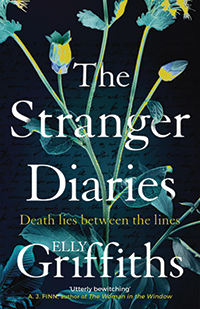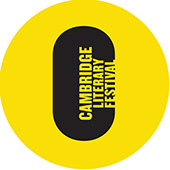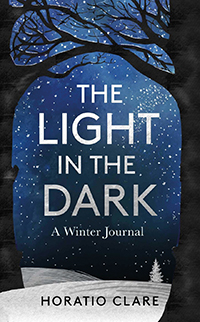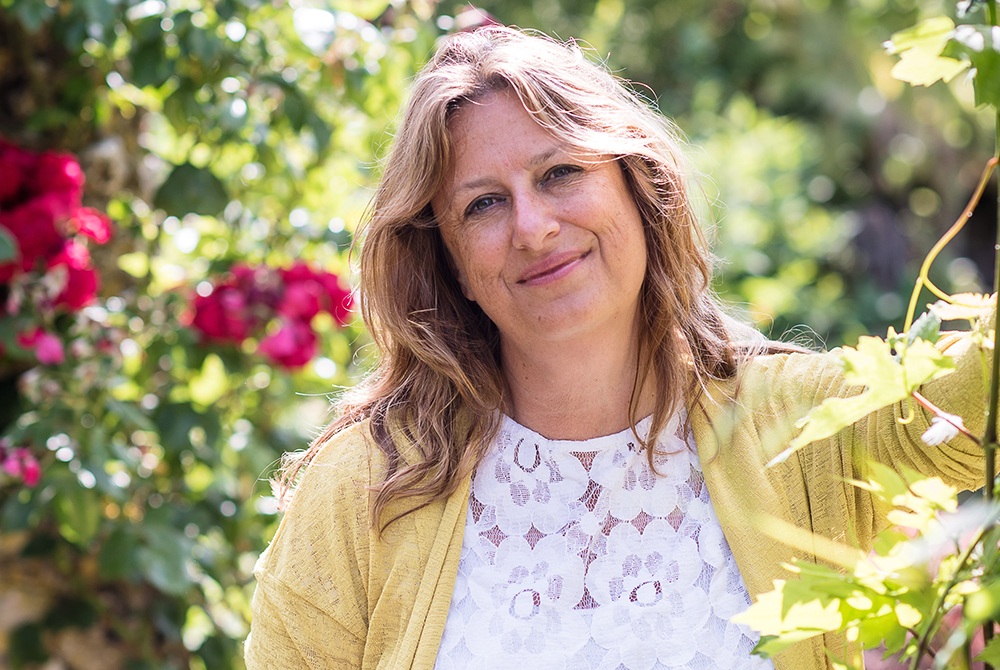Bringing you top new fiction picks, author interviews, discounts and lots more book chat, the Edition Book Club is a partnership with Cambridge Literary Festival and Heffers
The Stranger Diaries by Elly Griffiths
Interview by Charlotte Griffiths
Draw the curtains, lock your door and settle down with the perfect wintry read: The Stranger Diaries follows Clare Cassidy, a teacher who specialises in the (fictional) Gothic writer R.M. Holland, and two other narrators – Clare’s teenage daughter Georgia, and Detective Sergeant Harbinder Kaur. The book opens as one of Clare’s fellow teachers is killed in mysterious circumstances, a quotation from R.M. Holland found next to the body – colliding Clare’s worlds and giving ever-suspicious DS Kaur good reason to keep an eye on Clare. A habitual diary keeper, Clare records her fears for herself and her daughter in her journal, giving us glimpses into her innermost thoughts. But in a frightening twist, it turns out that it’s not just us who’s spying on Clare’s diary: she starts to spot writing in her journal which isn’t her own. And wherever there are diaries, there are always secrets…
The Stranger Diaries is the first Elly Griffiths novel not to be part of a sequence: if you’re already familiar with the author’s pen name, it’s probably because of her hit series following forensic archeologist Dr Ruth Galloway, or the Stephens and Mephisto novels, set in the 1950s – both of which keep Elly extremely busy. “I’ve also written four standalone books under my own name, as Domenica de Rosa, which were mainly romances about Italy and families,” the author explains. “At the moment I’m writing two books a year for my two series – but this is the first standalone crime novel as Elly Griffiths, which I finished writing in February this year.”

This book’s beginnings were appropriately sinister: “I started writing it on that day last October when the sky went strangely yellow,” Domenica says. “I’d had lunch with my editor Jane in Brighton, I’d had some ideas about what I was going to do with this book. We came out of the restaurant and people were looking up at the sky – it was really weird,” she continues. “As I was driving home, I suddenly realised how I was going to start the story – with the story of the Stranger, the man on the train – and I got home and wrote the first chapter.”
Domenica had wanted to write Gothic horror for a while, but didn’t want her book to be historical, or set in the Victorian era, so struggled with how best to work in this genre. One of the key elements of any horror is an atmospheric location, which in The Stranger Diaries almost becomes a character itself. “The school is an amalgamation: a sort of concentrated broth,” she says. “It’s a little bit based on a place called West Dean College, where I teach creative writing, and my old comprehensive school, Cardinal Newman in Hove, which was partly an old convent complete with a story about a nun who fell down the stairs and haunts the building…”
As you’d expect from such a prolific writer, Domenica is normally careful to plot her way through a book before starting out. However, The Stranger Diaries saw her take a looser approach. “This has really been a book where I just let the story take me,” she says. “I vaguely knew where I wanted it to go. I didn’t really know who my three narrators were when I started, but I knew I wanted to thread the Victorian ghost story through it, and that I wanted to bring in the idea of the diary. I’m very interested in the idea of why people keep diaries: I’ve kept one since I was 11 – and I still write in it quite often, but I’m interested as to why people do this. I’ve always really been struck by that bit in The Woman in White by Wilkie Collins, where Count Fosco finds Marian’s diary and doesn’t just read it, but writes in it – I’ve always thought that was just so villainous!” she laughs.
One of her narrators, Clare, keeps a handwritten diary, while the character’s daughter Georgia writes a digital journal: this generational difference was something the author was keen to explore. “For me, that process of going from the brain, to the hand, to the page, is almost therapeutic – but I think for young people, that’s a bit different,” she says. “It’s always struck me that it’s very easy for people like me to say ‘Ooh, they’re on their phone again…’ – but they’re not always ‘on their phone’. It’s my generation – I’m 55 – who are on Twitter and Facebook and things. Quite a lot of what the younger generation is doing is creative, and quite literate. They’re reading a lot, and sometimes they’re writing, and we forget that: we say ‘oh, they’re playing…’ I wanted to explore that, and show that Clare, a devoted mother, didn’t understand what Georgia was doing or that she was also a writer, just in a different way.”
Along with diary-keeping, creative writing features heavily in the plot. As a creative writing teacher herself, Domenica had a lot of fun with some of the criticism that her characters come out with. “It’s funny,” she says, “people say, ‘Either you can write, or you can’t…’ but there’s no doubt that you can become a better writer: you can become better at anything, can’t you? The real plus about creative writing courses, writers groups, anything like that, is that it does just make you write. Maybe that’s the main thing: when you’re on a course you have to do an assignment, you have to write…”
As with most writers, Domenica is an avid reader. “I’m always reading – I usually have a couple of books on the go,” she says. “In my hotel room I have Tombland, the new C.J. Sansom and in my bag I also have Venetia by Georgette Heyer.” It was a book group recommendation that first introduced her to C.J. Sansom’s work. “I really enjoy my book club,” she says. “They introduced me to all sorts of books, and just getting together, drinking wine and talking about books is great…plus people who like books do tend to be really nice!” she laughs.
If you’re convinced enough to consider putting The Stranger Diaries forward to your own book club, Domenica has some advice to help you persuade others: “I hope they’d find it an interesting story, that’s both a ghost story and a modern crime, and with a bit of humour in it and some memorable characters. And a nice dog – it’s important to have a nice dog.”
 Cathy Moore, director of Cambridge Literary Festival, on The Stranger Diaries
Cathy Moore, director of Cambridge Literary Festival, on The Stranger Diaries
I have long been a fan of Elly Griffiths and her best-selling Dr Ruth Galloway mysteries so I was curious and excited to read her new standalone novel The Stranger Diaries. I was not disappointed.
She has written a pitch-perfect contemporary gothic thriller which owes much to the writings of M.R. James and Wilkie Collins.
The opening lines immediately set the tone. “‘If you will permit me,’ said the Stranger, ‘I’d like to tell you a story. After all, it’s a long journey and, by the look of those skies, we’re not going to be leaving this carriage for some time. So, why not pass the hours with some storytelling? The perfect thing for a late October evening.’”
The novel is told through the eyes of Clare Cassidy, a literature teacher specialising in the Gothic writer R.M. Holland. Her life and work tragically collide when a colleague is found dead, with a line from an R.M. Holland story by her body. What follows is an accomplished, funny and gripping tale told through the eyes of several protagonists including Harbinder, the very appealing detective. It is made all the more enjoyable by Griffiths’s obvious mastery of and pleasure in the gothic form. If you enjoy it do go on and read The Woman in White by Wilkie Collins and almost anything by the quite brilliant M.R. James.
Cathy Moore is the director of Cambridge Literary Festival
Up next month: The Light in the Dark: a Winter Journal
by Horatio Clare 
Our first non-fiction selection, next month’s Edition Book Club pick is The Light in the Dark: A Winter Journal, by multi award-winning memoirist, nature and travel writer Horatio Clare.
This evocative exploration of the season combines scintillating nature writing with a moving personal narrative, touching on issues of depression and Seasonal Affective Disorder.
In a powerful and lyrical exploration of a British winter and the feelings it inspires, Clare holds a torch against the darkness, illuminating the blackest corners of the season and delving into memory and myth to explore the powerful hold the season has on us. By learning to see, he writes, we can find the magic, the light that burns bright at the heart of winter: spring will come again.
The Light in the Dark is available to purchase at Heffers. Read along and tweet us your thoughts @cambsedition, with the hashtag #EditionBookClub for a chance to feature in the next issue!
IN ASSOCIATION WITH

Look out for the Cambridge Edition book club stickers in Heffers and get money off our monthly pick. Heffers is at 20 Trinity Street, Cambridge Blackwells.co.uk

